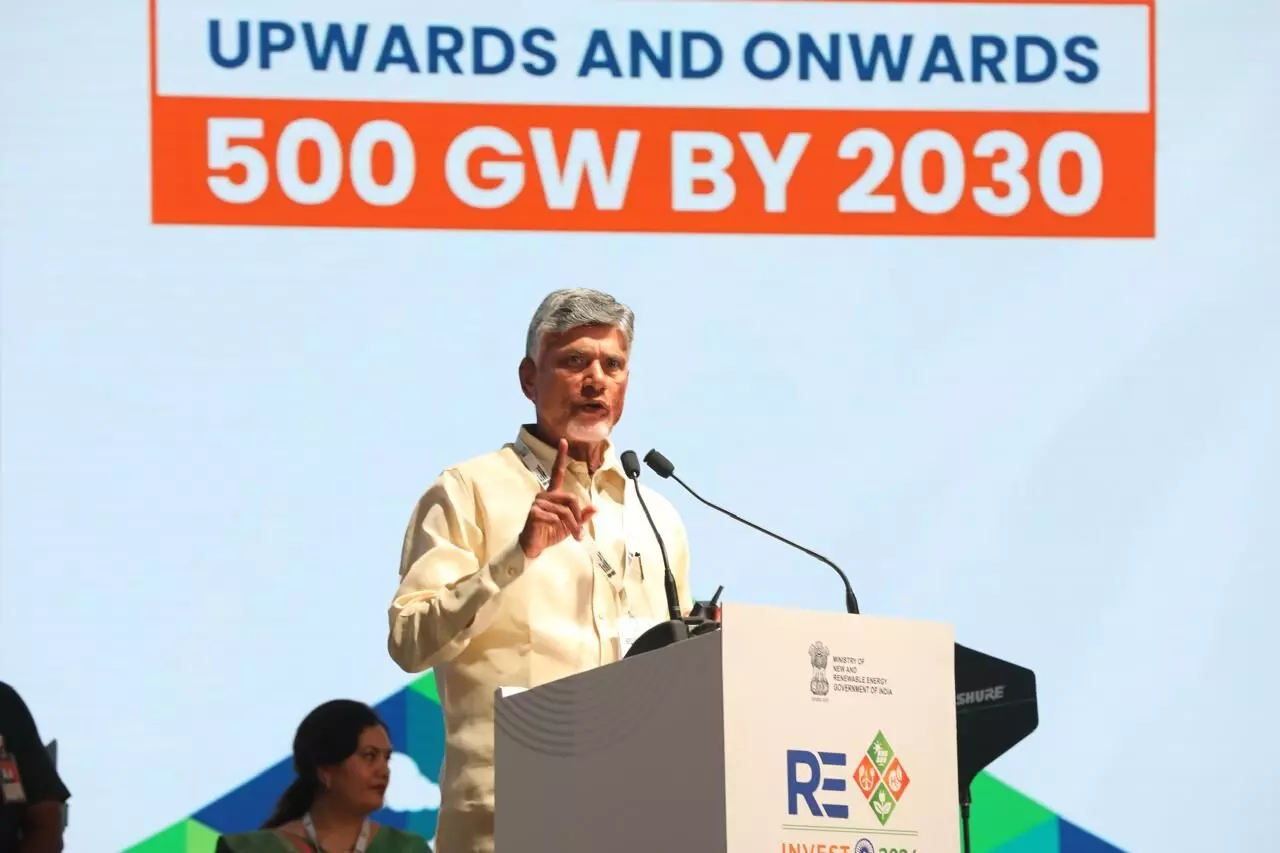AP targets 72.60 GW renewable energy by 2030: CM Naidu
He invited global investors to take advantage of the State’s investor-friendly policies
By Newsmeter Network
Gandhinagar: Chief Minister Chandrababu Naidu took the spotlight at the 4th Global Renewable Energy Investment Meet, inaugurated by prime minister Narendra Modi in Gandhinagar, Gujarat, where he spoke about the immense potential of clean energy for India’s future.
Speaking at the Chief Ministerial Plenary, CM Naidu pledged Andhra Pradesh's commitment to generating 72.60 GW of renewable energy by 2030, aligning with India’s goal of 500 GW by the same year. He mentioned that this initiative would create jobs, protect the environment, and make Andhra Pradesh a leader in green energy.
CM Naidu highlights AP resources
Promoting Andhra Pradesh as the next big player in green energy, the chief minister highlighted the State’s coastline, strong industrial base, excellent transport links and vast potential in solar, wind, pumped storage, and green hydrogen.
He invited global investors to take advantage of the State’s investor-friendly policies, which include tax breaks, subsidies, and easy regulations, along with a skilled workforce. “I want to create one of the best ecosystems for green energy in India,” he said.
CM Naidu also stressed the importance of adopting global best practices in renewable energy, focusing on R&D, policy support, and removing obstacles for emerging technologies. He announced plans to establish a Global University for Clean Energy and Circular Economy to encourage knowledge sharing and innovation.
Renewable energy targets
The chief minister said that the State had set renewable energy capacity targets with 40 GW solar energy, 20 GW wind energy, 12 GW pumped storage, 25 GW battery energy storage, 1 MTPA Green Hydrogen and derivatives, 2500 KLPD biofuels and 500 public charging stations for electric vehicles.
He further informed that AP has installed 4335.28 MW of Solar, 4083.57 MW of wind power, 106 MW of small hydro, 443 MW of bioenergy and 36 MW of waste to energy so far. Around 4000 MW solar power parks were established in Ananthapuram, Kurnool and Kadapa Districts. Another 2700 MW Solar capacity is upcoming in Prakasam district and Sri Satyasai district.
10 lakh households for solar energy output
The CM mentioned that the State government is implementing PM Surya Ghar Muft Bijili Yojana and targeted to install roof top solar in 10 lakh households by 2026-27 apart from the target of 26 model solar villages (1 solar village in each district) and solarization of Government buildings on saturation mode up to 150 MW by 2025-26 with support of NTPC Vidyut Vyapar Nigam Ltd (NVVN).
“As part of PM KUSUM, the State has implemented Feeder level solarisation of agricultural feeders with an aggregate capacity of 3725 MW and also installed 31,275 off-grid solar pump sets. AP has also taken lead to promote pumped storage projects at 39 locations with an estimated potential of 43.89 GW to balance its variable renewable energy (VRE) generation and minimize the grid imbalances,” he said. He added, “We’ve seen PPPs, Public-Private Partnerships. I’m introducing P4-Public, Private, People’s Partnership. I want to involve the people as partners in renewable energy.”
Explaining the incentives proposed under draft ICE policy 2024, the chief minister said that the State government is giving priority for promotion of renewable energy projects and rolling out multiple initiatives, policies and incentives to accelerate the development of the renewable energy sector.
“The Government shall provide vital incentives for the development of wind projects and turbine manufacturers and waive off the transmission and wheeling charges to promote RE equipment manufacturing and development of RE infrastructure projects and also provide sector specific capital and interest subsidies to foster innovation and contribute to a greener, more resilient energy grid. Apart from these, the government shall provide production incentives to RE equipment manufacturers and subsidies on power costs and electricity duty to reduce expenses and promote RE manufacturing facilities,” he said.
“The next revolution will be the Green Energy Revolution,” he remarked.